- Home
- Jennifer Macaire
The Eternal Banquet
The Eternal Banquet Read online
THE ETERNAL
BANQUET
Jennifer Macaire
Thetis, crying bitterly to her son Achilles:
“Alas! Oh my son, Why did I bear you and raise you only for misfortune? You should have stayed by your ship without tears and laments, for your destiny draws near and your life is to be far too short. Today, of all the men in the world, you are both the one who must die the soonest and the most sorrowfully. Since the day you were born in my palace that has been your unfortunate fate. Nonetheless, I shall go to the snowy peaks of Olympus to speak to Zeus, lightning-thrower, of your wish. Stay here for now, near your swift vessel, and nurse your anger. Guard your furor and cease to fight. For yesterday Zeus left over the ocean, to visit the Æthiopians and share a magnificent banquet. All the gods have accompanied him …”’
Homer: Iliad 1.413-24
“Hold fast and hold back”
Anekhou kai apekhou
Stoic’s motto
Chapter One
The sky was a vast blue upside-down teacup over our heads. The sun beat upon the wooden deck of the dragon ship and reverberated off the waves in a million sharp diamond points. There was not a breath of wind; the sails drooped listlessly. The chickens gasped in their cages, beaks wide, yellow eyes dull. In the hold, sunlight sparkled off the dust surrounding us in a nimbus of golden heat. We lay without moving. Beneath linen sheets, prickly hay smelled like mown fields under a blazing sun. Waves slapped against the wooden hull of the ship, but the sound didn’t cool us.
When the heat grew unbearable, we would go above deck, sluice ourselves with buckets of seawater, then come back and collapse in the shade. The deck was blistering hot, and our wet footprints evaporated immediately. Whoever went on deck was expected to throw water over the chickens and goats. The animals huddled in the shade, panting miserably. We were no better off. Everyone waited in silence for evening when, hopefully, we could row out of the dead calm.
We were off the coast of the Iberian Peninsula near the country that, in the future, would be known as Portugal. If I shaded my eyes, I could make out a thin black line of high cliffs on the horizon. Our boat captain, Phaleria, wanted to avoid them; treacherous currents made the lack of wind deadly. At night, we would try to row towards the Pillars of Hercules where the wind would surely be present.
I glanced through latticed windows and tried to judge the time. At least another four hours until sunset. I lay back and tried to sleep. I was tired; we had been rowing all night. But it was too hot to sleep. Instead, I let my mind wander. My thoughts were vague at first, darting here and there, not settling on any one thing. The present was too hot. The future was uncertain. Our voyage had started well, but if we didn’t get out of these doldrums soon, we’d run out of fresh water.
Dying of thirst would be a new one for the man lying next to me in the hay. Alexander, also known as Alexander the Great, pushed a lock of sweat drenched hair off his forehead and, seeing me staring at him, gave a wry grin. So far, according to historians, he’d died of malaria, poison, cholera, alcoholism, and acute pancreatitis. Only he hadn’t died. I’d saved him.
Born in the far future, I’d won a prestigious award and had been chosen to voyage back in time for a day to interview the one of the world’s greatest conquerors. Alexander had mistaken me for Persephone, goddess of the dead, and kidnapped me. We fell in love, and I saved him when he lay dying in Babylon. The rest, as they say, is history.
I leave out much of the story, like the part where I grew up alone in an echoing mansion, raised by parents who despised me, or when I married a man who tortured me mentally and physically. My childhood crippled me emotionally. But it was nothing compared to Alexander’s. Raised by a hysterical mother and a violent, alcoholic father – abused by his mother, beaten by his father – it’s a wonder he became the leader he was. He credits Aristotle for helping him. I think he’s partly right. He also says love saved him. My love, and Plexis’s – Hephaestion’s – love saved him, as well as the love of our children and friends. In the end, it all boils down to love.
We had left the British Isles after Demos and Phaleria celebrated their wedding. The sea was clement and the wind brisk. We made good time to the coast of Gaul where we docked near the mouth of the Seine River. On a rocky pier jutting out of a long, grey beach, we traded with a tribe of Gauls.
The dragon boat made a huge impact wherever we arrived. Most people hung back, waiting prudently to see who was sailing it. When they saw it wasn’t raiders, they approached and traded with us, asking for the latest news and giving us news of their own. That’s how we heard about Carthage attacking Tartessos.
Alexander grew agitated and asked a million questions. I was afraid he’d start to shake the fellow who was giving us the news, so I took him by the arm and drew him away.
‘Alex, calm yourself. You’re no longer responsible for Greece.’
‘But that was one of our best trading posts. It was Phoenician, not Greek,’ he said, running his hand through his hair, a gesture that meant he was upset.
‘When you captured Tyre you conquered the Phoenicians,’ I reminded him. ‘In the history books it says that the Phoenicians “had a great civilization, which ended with the conquest of Alexander the Great”.’
‘They say what?’ His hand froze, comically, on top of his head. His face showed a mixture of emotions, as usual. ‘I never meant to end any civilization. I left them their government. I left them their trading posts, like Tartessos. I even let them keep on wearing their silly hats. I never ended anything.’ He looked forlorn.
‘Their silly hats?’ I raised an eyebrow – a trick I’d learned from him.
He just shook his head. ‘Carthage.’ The word was said with a queer mixture of anger and longing. I knew what it was. He would have loved to have captured Carthage for his own.
I looked at the crowd standing on the pier. Demos was easily visible, a head taller than the other men around him. Near him was his new wife, Phaleria, her bright red hair plaited into two tight braids reaching her waist. She wore copper arm bracelets, a gold necklace, gold earrings, and silver rings. Her clothes were gaudily coloured and lavishly embroidered: a bright yellow skirt, a green tunic, a blue shawl, and a red vest. She looked every part the wealthy Celtic trader.
Nearby, listening to the gossip, was Nearchus. He had grown a curly beard and it made him look even more serious, if that was possible. He had been Alexander’s admiral for ten years, and his smiles were as rare as summer snow. Right now, he looked grim. His loyalties lay with the Greeks and Phoenicians, not with Carthage.
Alexander’s and my son, Paul, stood next to Yovanix, who had stopped wearing his bandage on his blind eyes, baring his scars to the world. They still made me shudder, for I had been the one to put his eyes out. Yovanix could always tell when I looked at him. He told me my glance was like a cool touch, and sure enough, he turned towards me and his handsome face lit up in a smile. Axiom, Alexander’s valet, was on the dock as well.
As we stood near the boat, green waves crashing against the rocky shore, I noticed tall megaliths in the distance guarding the entrance to what looked like a grove of sacred oak. Wanting to get a closer look, I left our group and went to explore.
‘Where are you off to?’ Plexis, bored with the trading, joined me.
‘I want a closer look at those stones.’ I pointed, then lowered my arm, confused. ‘They’re not there any more.’
‘What aren’t there?’
‘Big stones, standing in line in front of the trees.’ I rubbed my eyes with my hand. Dazzled by the light? No, the sun was behind me. I was sure I’d seen megaliths. ‘I’m going to have a look anyhow,’ I said, and set off. There was a path leading to the woods. It was late
summer and the air was full of pollen. Gold, scarlet, and blue flowers bloomed in the salt meadow where flocks of sheep grazed. Beneath an apple tree, I spied a young shepherd playing a tune on a wooden flute.
‘Excuse me,’ I said, addressing the shepherd in my awkward Celtic. ‘Is that grove of trees sacred? Can I go to look?’
The youth put his flute down and stood. ‘I’ll take you. The grove is sacred, but everyone is welcome.’ He had replied in Latin. I gave him a closer look. He had swarthy skin and black, shiny hair. His eyes were black as well, but when the sun hit them I saw they were dark purple, like mulberries. ‘I’ve been expecting you,’ he added.
Plexis stepped in front of me protectively. ‘What do you mean? Who are you?’
‘You can call me Myrddin.’ He nodded towards the forest. ‘And I’ve been expecting you because I’m a druid.’
There was a whisper of metal on leather as Plexis drew his sword from its sheath and pointed at the youth’s throat. ‘Don’t move,’ he ordered. To me he said, ‘Call Alexander. I’ll hold this one here. Hurry, we’ll —’
‘That’s not necessary. I mean no harm, to you, Hephaestion, or to you, Ashley of the Sacred Sandals,’ the shepherd said with a laugh.
I gaped at the boy. ‘How did you know our names?’
‘I’m Myrddin.’ He shrugged. ‘Come, you wanted to see the stones, didn’t you? I’ll be your guide.’
Plexis didn’t lower his blade. ‘“I’m Myrddin” is not an explanation,’ he said.
Myrddin looked startled, then closed his eyes and seemed to listen to a voice in his head. ‘You will know me better as Merlin. I was waiting for you, Ashley, to explain that we do not usually meddle in fate. What is written in your books shall come to pass. I’m sorry Voltarrix found you. He started a rebellion in our clan, and I am not yet strong enough to have been able to stop him. I want to assure you that the druids are your friends, not your enemies.’
A nervous laugh escaped me. ‘You? Merlin the Enchanter? You’re in the wrong time. Arthur won’t be born for another three centuries.’ I put my hand to my head. ‘Did I fall off the boat and knock myself out?’
‘No, you didn’t fall, and yes, I know the future king won’t be born for while. I will have to wait, but I won’t be bored. According to the legends, I’m going to Albion to build Stonehenge.’ He gave a rueful shrug. ‘I can’t help it, I see all the centuries at once, as if they were pages in a book. Sometimes I get confused.’
Plexis frowned at me. ‘Do you believe him, Ashley?’
‘I don’t know what to believe. You do see him, don’t you? A young man with black hair, talking about legends? He mentioned Albion but in the future, it’s called Britain.’
‘Yes, I see him too.’ Plexis sighed and sheathed his sword. ‘I don’t suppose you’re going to listen to me and go back to the boat now, are you?’
‘Come.’ Merlin turned and walked towards the grove of trees.
‘You’re not going to listen, are you? Can’t you be reasonable for once?’ Plexis asked me.
‘I can be reasonable,’ I admitted. ‘But not this time.’ I trotted after Merlin. After a moment, Plexis followed.
We stepped into the shade of the trees and followed a well-trodden path to a large clearing. Here, Merlin turned to face us. ‘Hold my hands’, he said. I’d scarcely touched his hand when it turned dark, as if a lid had slammed down on us. I opened my mouth, but Merlin said, ‘Hush. Just watch.’
In the penumbra, I saw glimmers of light. A group of men entered the clearing in front of us. They paid us no heed. They carried rough torches made of burning branches. On their faces were streaks of coloured clay, and rough furs hung from their backs. They had dark brown, nearly black skin, and their blue eyes were pale in their faces. Black, curly hair covered their heads. They didn’t speak, but growled and grunted. They paused in the middle of the clearing then became transparent and disappeared.
The darkness seemed to deepen. After a moment, a new group of men crowded into the clearing. They were dressed in rich clothing. Some had velvet capes and others wore silk doublets and lace collars. They carried swords, but one had a pistol. The group huddled together for a moment, and one man looked up at the sky and said, ‘Ma bone espee que ai ceint al costet, tut en verrez le brant ensanglentet! Jo vos plevis!’ The others raised their fists and cried, ‘Jo vos plevis!’ I knew they were swearing by the blades of their bloody swords, but the French was archaic. As we watched, they too, faded.
The glade became lighter, and a new group of five men, dressed in ancient army attire, stumbled in. I recognized them as being soldiers from the Second World War. One was wounded. They scanned the area and flinched, as if hearing sounds we could not. ‘I’d sell my grandmother for a drink of water,’ said the wounded man. He could barely stand. Two other men held him upright. ‘Be quiet, Sean.’ whispered a soldier. He hefted his rifle. ‘How much ammunition do we have left?’ Before anyone could answer, the group of soldiers disappeared.
The glade was empty except for a deer. Carefully, it moved across the clearing, looking for shoots to eat. It nibbled on a bramble bush, then a noise must have startled it. It raised its two heads and looked around. One head turned one way, the other head turned in the other direction. One head was fully formed but the other had no eyes; skin covered its eye sockets. It lowered the blind head and began to graze and then, like smoke, it vanished.
Merlin released my hand. The scene shifted. We still stood in the woods, but sunlight dappled the ground. Plexis gasped. ‘What happened to that animal?’
‘The deer? It’s from all the radiation. After the great divide, we …’ I stopped. Plexis looked ill. ‘I’m sorry. The scientists say it’s getting better. In a few centuries, Europe will be liveable again.’ I felt like crying and glared at Merlin.
‘Time is a strange thing,’ said Merlin. ‘I didn’t show you that to upset you. I wanted to show you how time is like a piece of mica. There are layers upon layers, and all are transparent. I can see through those layers. It is my gift and my curse.’
‘What about the stones? I said. Did they ever exist?’
‘Yes, they are over there, in the deep grass. They are lying down, but soon men will come and raise them.’
We went back into the meadow and sure enough, seven megaliths lay on their sides. They were freshly hewn. I could see the marks left by the chisels. Gouges in the stone glittered in the sunlight. I climbed on one and stood, balanced on the warm granite. Plexis climbed up next to me. ‘We can see the shore from here,’ he said.
‘Yes, There’s Alexander. He’s waving at us. They must have finished trading.’ I turned to Plexis. ‘Do you want to talk about it?’
He shook his head. ‘No. I told you once before, you’ve ruined the future for me. Perhaps there is something good in it, but I have yet to see it.’
Merlin shook his head. ‘Ashley is a child of the future,’ he chided. ‘So there is good there too. She doesn’t see things the way you do, Hephaestion. I hope you will remember my words. She acts without thinking of the consequences sometimes, but her heart always guides her. Follow her heart. You will be safe.’ With that, he bade us farewell.
When I boarded the ship, I looked back at Merlin – or Myrddin, whoever he was – and waved. He raised his arm, the wind picked up, and we sailed out to sea. The water turned from blue to green. Plexis didn’t speak to me for a whole day, but when he came to me, he opened his arms, inviting me in.
‘I’m sorry,’ he said.
I pressed my cheek to his chest. ‘You were upset. I understand.’
‘It was cruel to say you ruined the future. None of it is your fault. And Merlin was right. There is good there, if it produced you.’
Our next stop was further down the coast, to stock up on supplies. Paul and Plexis went into the village with Axiom to buy mineral water. This place was famous for its sacred springs. The waters here were supposed to cure rheumatism and various other ills. Axiom suffered from rheumatism in
his elbow and wrist, which was not surprising; he’d broken it badly when he was a child and it hadn’t been set right.
Paul and Plexis had also taken Paul’s young dog Perilous with them. They were busy training it to be a guide dog for Yovanix. So far, they’d trained the dog to walk sedately and sit on command. Plexis trained horses, so he was confident he could train a dog.
Yovanix was standing near Demos. That day he wore a white linen bandage around his eyes. I turned my head, but not before Alexander saw my expression. ‘It wasn’t your fault,’ he said softly.
‘Everyone keeps telling me that., but it was my fault, even if I didn't know it was him. It’s so unfair.’ I rested my head on his shoulder. ‘Why do I feel so close to you?’ I asked. ‘How is it that I want you to hold me in your arms and never let me go?’
‘Never, ever let you go?’ he asked, eyes hooded.
‘Hold me forever,’ I agreed.
‘Because you are melancholy. I feel it too sometimes. Usse gives me a potion for it. But I will be your potion.’ He smiled and kissed me. ‘What happened in the land of your ancestors was a terrible shock for you. You lost a hand and you nearly lost your life. You watched a terrible druid cut my throat, and you were barely able to save me.’
‘Those were not the worst moments though,’ I said, burying my face in his neck. ‘When I had to kill those men, that was the worst.’
‘It wasn’t as if you’d never killed anyone before,’ he said. ‘Look what you did to poor Bagoas.’
‘I can feel you giggling,’ I said, my voice muffled. ‘It’s not funny. I didn’t want to kill anyone.’
‘Except Bagoas.’
I pulled back and looked at him. His face was still. Too still. I had the feeling he wanted to laugh. ‘Why are you in such a good mood?’ I asked.
‘Because, I have my soul back. I feel whole once more. I spent a year with the feeling I would fly apart, that the wind could blow me away. I was lost in a cold maze, and you and Paul saved me. Now I am whole again, I’m with the people I love, and we are heading towards home. The sun is bright, the sea is sparkling, and the druid’s potion against seasickness works wonders.’

 The Eternal Banquet
The Eternal Banquet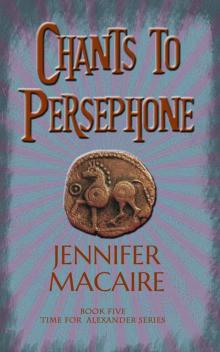 Chants to Persephone: The Future of the World Hangs on a Knife's Edge - and Only a Human Sacrifice Can Save It
Chants to Persephone: The Future of the World Hangs on a Knife's Edge - and Only a Human Sacrifice Can Save It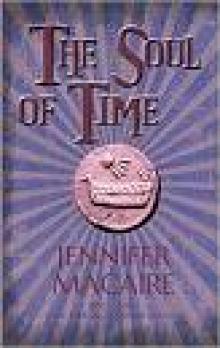 The Soul of Time
The Soul of Time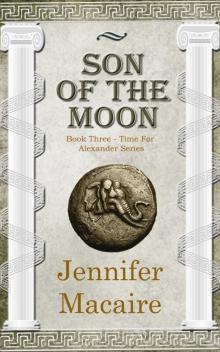 Son of the Moon
Son of the Moon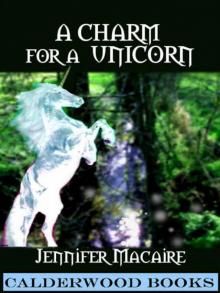 A Charm for a Unicorn
A Charm for a Unicorn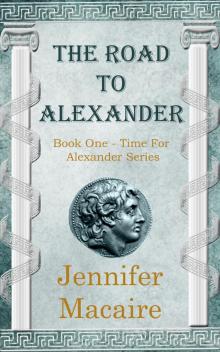 The Road to Alexander
The Road to Alexander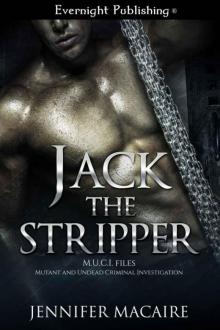 Jack the Stripper
Jack the Stripper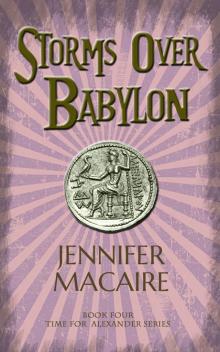 Storms over Babylon
Storms over Babylon Virtual Murder
Virtual Murder